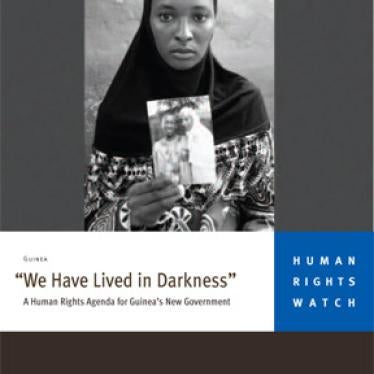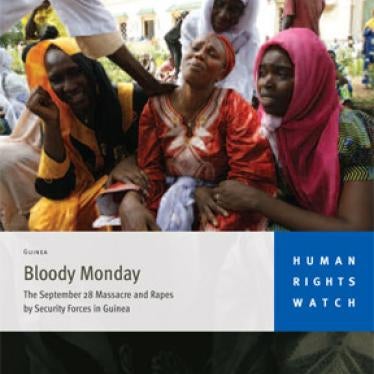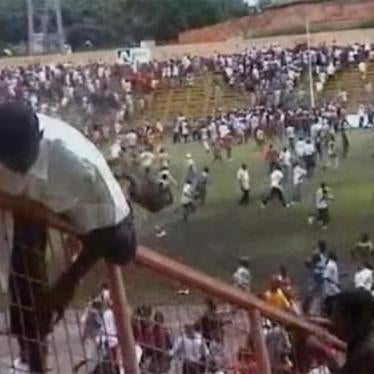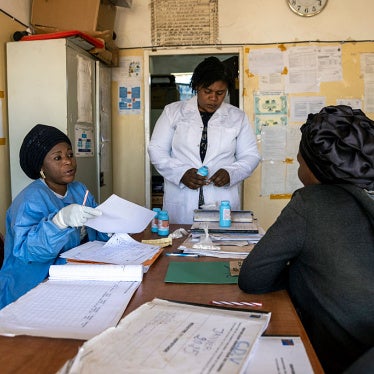(Nairobi) – The decision by investigative judges in Guinea to file charges against a high-level military official allegedly implicated in grave violations of human rights during a massacre of protesters in 2009 is an important step toward ensuring justice for the victims, Human Rights Watch said today. Security forces were implicated in the killings of more than 150 opposition members and the rape of over 100 women in the aftermath of a peaceful demonstration.
Col. Moussa Tiégboro Camara is the highest-level official to be questioned and charged in relation to the crimes. On February 8, 2012, Tiégboro Camara appeared before the investigative judges overseeing the investigations, following the filing of charges on February 1. Tiégboro Camara has been cooperative and was not taken into custody, sources in Guinea said.
“The courageous work of the judges and the charges against Colonel Moussa Tiégboro Camara are an encouraging and meaningful step forward for justice in Guinea,” said Corinne Dufka, senior West Africa researcher for Human Rights Watch. “Ensuring justice for the 2009 victims and their families would help break the cycle of violence, fear, and impunity that has blighted the lives and hopes of so many Guineans for so many years.”
Human Rights Watch called on the Guinean government to support the judges’ work by allowing them to proceed independently and to undertake efforts to protect witnesses and victims. The group also called on the Justice Ministry to ensure that Tiégboro Camara and others accused in the massacre are prosecuted in accordance with international fair trial standards.
Tiégboro Camara is charged for his alleged involvement in abuses on and around September 28, 2009, as the security forces, some allegedly under his command, responded to what had been a peaceful demonstration by tens of thousands of protesters gathered at the main stadium in the capital. The demonstrators were protesting continued military rule and the presumed candidacy in planned elections of then-junta leader Capt. Moussa Dadis Camara.
Members of the Presidential Guard and other security units opened fire on the crowds, leaving about 150 people dead. Many were riddled with bullets and bayonet wounds, while many others died in the ensuing panic. Security forces subjected over 100 women at the rally to brutal forms of violence, including individual and gang rape, and sexual assault with sticks, batons, rifle butts, and bayonets.
A December 2009 report by Human Rights Watch and a 2009 report by a United Nations-led International Commission of Inquiry concluded that the abuses committed by security forces very likely constituted crimes against humanity. Both Human Rights Watch and the UN commission implicated Tiégboro Camara as among those most responsible for the serious crimes committed.
Human Rights Watch found that gendarmes personally commanded by Tiégboro Camara on at least two occasions used lethal force against opposition supporters converging on the stadium on September 28, resulting in the deaths of at least three unarmed protesters.
Later, Tiégboro Camara and gendarmes in his unit entered the stadium together with members of the Presidential Guard. Some of the gendarmes in his unit took an active part in the massacre, and, to a lesser degree, in the sexual violence that followed. Several witnesses told Human Rights Watch they saw Tiégboro Camara inside the stadium while many of the serious abuses described in this report, including murder and rape, were taking place.
The massacre was widely condemned by the international community. On October 14, 2009, the International Criminal Court (ICC) prosecutor, Luis Moreno-Ocampo, confirmed that the situation in Guinea was under preliminary examination by his office.
On February 8, 2010, three Guinean magistrates were tasked with establishing individual criminal responsibility for the September 28 events. In May 2010, the ICC reported that the investigating judges had interviewed 200 people. In addition to Tiégboro Camara, at least two other men have been charged for their alleged involvement in the September 2009 killings and rapes.
One of those charged is Lt. Aboubacar Sidiki Diakité, the then-head of the Presidential Guard, or red beret troops, at the time of the massacre, whose troops were most directly implicated in the crimes. He remains at large with his whereabouts unknown. On January 19, 2011, Interpol issued a Red Notice for Diakité.
Since January 2009, Tiégboro has been a minister in the presidency in charge of fighting drug trafficking and organized crime. Human Rights Watch expressed concern about his continuation in this appointment by President Alpha Condé, along with Lt. Col. Claude Pivi as minister of presidential security, who was also implicated in the September 2009 violence.
In a May 2011 report, Human Rights Watch identified several key challenges to ensuring that domestic investigations and prosecutions are conducted fairly, impartially, and effectively. These include the absence of a witness protection program, inadequate material resources for the judiciary, and antiquated penal codes. Guinean authorities still have considerable work to do in credibly addressing these issues, Human Rights Watch said.
“For years, political interference and intimidation has undermined the independence of the judiciary and contributed to the widely held perception that the powerful are above the law,” Dufka said. “The efforts by the judges and Ministry of Justice to hold accountable those responsible for the 2009 stadium violence are playing an important role in reversing this trend.”







